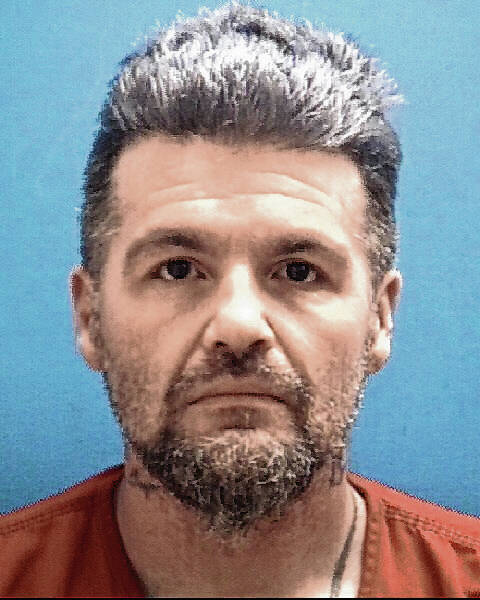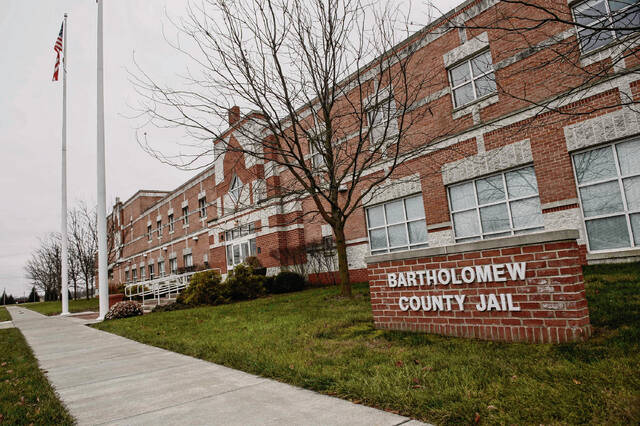
Sweet

The exterior of the Bartholomew County Jail in Columbus is shown.
Republic file photo
A bond reduction hearing for Jeremy Sweet, accused of felony neglect in the drowning death of his 2-year-old daughter, Emma, in November, was postponed Tuesday after his jail cell block was locked down due to multiple cases of COVID-19.
A determination was made not to attempt a video conference between the jail and the courthouse because such conferences require moving a number of inmates, said Bartholomew County Jail Commander Major John Martoccia.
“The less moving of people (under the current health concern), the better,” Martoccia said.
A court spokeswoman said the docket for Bartholomew Superior Court 1 Judge James Worton is extremely full, adding a jury trial scheduled to start next Monday could last more than a week. For that reason, a new bond reduction hearing will likely not be rescheduled for several days.
According to court records, a change of plea hearing in the case is scheduled for 4 p.m. April 4, and a trial is set for 8:30 a.m. May 10.
Sweet, 39, is charged with Level 1 felony neglect of a dependent resulting in death and other counts, accused of intentionally placing Emma in a situation that endangered her life and health and resulted in her death.
Sweet also is facing a Level 6 felony charge of possession of a hypodermic syringe, which investigators said was found on his person by paramedics when he was taken to Columbus Regional Health on Nov. 26. CRH paramedics located a syringe and an empty corner cut baggie (drug paraphernalia) on Sweet’s person, the probable cause affidavit states.
Sweet also faces a habitual offender enhancement that stems from a 2007 conviction of operating an illegal drug lab as well as a March 2016 conviction of dealing in methamphetamine, according to court records. If convicted of all charges, Sweet could be sentenced to more than 62 years in prison with the habitual offender enhancement.
He is being held in the Bartholomew County Jail in Columbus in lieu of $1.2 million bond (or 10% cash). He was arrested Thanksgiving Day weekend after Emma’s body was recovered from the East Fork White River, downstream from where hunters days earlier had found him in the river in his submerged truck.
Under lockdown
A single cell block at the jail containing about 30 inmates had been locked down, Martoccia said Monday.
He confirmed reports from callers to The Republic that several inmates who were symptomatic and tested positive for COVID-19 were returned to cells shared with inmates who had not tested positive, and that cell block was then placed on lockdown so inmates in that cell block would not interact with the remaining jail population.
“They’re not out running around with anybody else,” Martoccia said in a phone interview of those in the quarantined cell block. “It’s jail, and I don’t have any space. … We’re out of quarantine space.”
As of Monday evening, Martoccia said about 240 people were in the jail that has 366 beds, but he said the bed count is not an accurate measure of how many inmates the jail can reasonable handle, particularly during a pandemic.
He said, for example, female inmates must be segregated in an individual cell block, so if there are unoccupied beds in that block, those beds cannot be used for other inmates. Likewise, inmates brought to jail are quarantined before they’re assigned to a cell.
At the beginning of the COVID outbreak, the jail tried to keep the inmate count between 190 and 210 people, Martoccia said. Prior to the pandemic, the jail routinely housed 260 to 270 inmates, he said.
Martoccia said he has been working with the prosecutor’s office and courts to determine if the jail numbers can be reduced by releasing low-risk offenders. Complicating the situation, Martoccia said there are about 15 inmates currently in the local jail who are awaiting transfer to serve sentences in the Indiana Department of Correction, but the state isn’t accepting them.
“We’re doing the best we can inside these walls,” Martoccia said.
He said every inmate is given two masks and soap, and the health of inmates is monitored by jail staff. Inmates must wear masks outside their cells but cannot be required to wear masks in their cells.
Likewise, Martoccia said jail staff cannot require inmates to be tested for COVID-19, and many decline tests even if they show symptoms. In the case of the four who recently tested positive, he said, the sick inmates “finally spoke up.” He said their symptoms were not severe enough to require further medical treatment, so they were returned to their cells and the cell block was locked down.
“They had already been exposed to everybody in that block,” he said.
The Indiana State Department of Health replied to a request for comment concerning the jail situation by referring to guidance from the Centers for Disease Control and Prevention. Those guidelines dated January 2021 state in part that “people who are incarcerated and have COVID-19 should be placed under medical isolation in a separate room, ideally with solid walls and a solid door that closes fully.”
